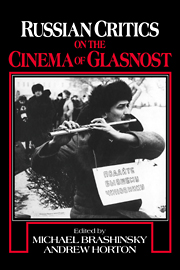Book contents
- Frontmatter
- Contents
- Acknowledgments
- Introduction
- Part One Films in a shifting landscape
- Part Two Glasnost's top ten
- I Repentance
- II Is It Easy To Be Young?
- II A Forgotten Tune for the Flute
- IV The Cold Summer of '53
- V Assa
- VI Commissar
- VII Little Vera
- VIII The Days of Eclipse
- IX The Needle
- X Taxi Blues
- Conclusion
- Directors' biofilmography
- Filmography
- About the contributors
- About the editors
- Index
IV - The Cold Summer of '53
Published online by Cambridge University Press: 04 August 2010
- Frontmatter
- Contents
- Acknowledgments
- Introduction
- Part One Films in a shifting landscape
- Part Two Glasnost's top ten
- I Repentance
- II Is It Easy To Be Young?
- II A Forgotten Tune for the Flute
- IV The Cold Summer of '53
- V Assa
- VI Commissar
- VII Little Vera
- VIII The Days of Eclipse
- IX The Needle
- X Taxi Blues
- Conclusion
- Directors' biofilmography
- Filmography
- About the contributors
- About the editors
- Index
Summary
Stalin dies in 1953, and a gang of criminals released from a forced labor camp roams into a small northern Russian village. Two political exiles, Chaff (or Luzga) and his older friend, Digger, take on the task of defending the helpless townsfolk. Many, including Digger, die in the final shootout. At film's end, Chaff returns to the city to tell Digger's wife and son of his death, but neither seems particularly interested. As in any classic Western, Chaff walks off alone.
The Cold Summer of ‘53 {Holodnoye leto 53- go). Directed by Alexander Proshkin; screenplay by Edgar Dubrovsky; cinematography by Boris Brozhovsky; production design by Valery Filippov; music by Vladimir Martynov. Cast: Valery Priemykhov, Anatoly Papanov, Victor Strepanov, Yuri Kuznetsov, Vladimir Kashpur, and Nina Usatova. Color, 101 min. Mosfilm Studios production, 1987.
4. Kopalych (Anatoly Papanov, right) and Luzga (Valery Priemykhov) are political exiles of the late Stalinist period, but when they have to defend their villages from bandits, they play as hard as if they were at the O.K. Corral in Alexander Proshkin's The Cold Summer of ‘53 (1987). (Photo: Kinocenter and Sovexportfilm.)
“The birds of passage are flying in the blue autumn distance.… ” This pathetically patriotic Stalinist song could have been played on dozens of turntables in the comfort of a retro fairy tale about totalitarian movie myths. Instead, the song is yelled out to the accompaniment of a boat motor by a bulky fellow wearing an unbuttoned coat, eyes bulging.
- Type
- Chapter
- Information
- Russian Critics on the Cinema of Glasnost , pp. 79 - 86Publisher: Cambridge University PressPrint publication year: 1994



